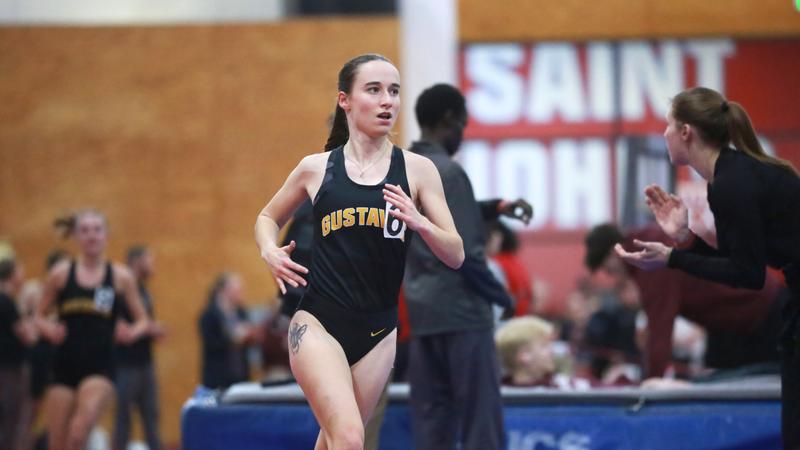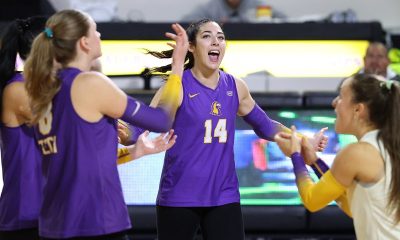Sports
“RIP”


ADVERTISEMENTBack in 2007, he was appointed as the head therapist in the World University Games that took place in Bangkok. He also traveled to the Japan International Grand Prix, providing much-needed assistance to the swimmers as they toiled hard in the chlorine-soaked waters. However, his rise to prominence dates way back to 2001. The experienced chiropractor was a staff member at the 2001 Goodwill Games in Australia and also at the Pan Pacific Championships in Japan back in 2002. Continuing with his good work, Dr. Campbell also accompanied Team USA at the 2003 FINA World Swimming Championships. Unfortunately, the swimmers will not be able to get the services and guidance of the veteran chiropractor from now on. As Dr. Brian Campbell has bid adieu to his earthly abode. ADVERTISEMENTADVERTISEMENTADVERTISEMENTArticle continues below this ad
Article continues below this ad
Sports
Men’s Track & Field: Stefanowicz Tops Hurdles Record at M City Classic

MINNEAPOLIS, Minn. – The Macalester College men’s track & field team opened the 2026 indoor season at the M City Classic, hosted by the University of Minnesota on Friday. Senior Sebastian Stefanowicz (Portland, Ore./Valley Catholic) broke the school record in the 60-meter hurdles.
Stefanowicz finished fifth in the 60-meter hurdles behind three Division I athletes and an unattached runner with a time of 8.63. The performance betters the old record of 8.68, set by John Shepard ’01 in 1999. Senior Hamza Mahamud (Eden Prairie, Minn./Eden Prairie) finished seventh in 9.10. Stefanowicz also placed 12th in the 60-meter dash with a time of 7.15, which ranks sixth on Macalester’s all-time performance list.
In the 600 meters, seniors Henry Schonebaum (Faribault, Minn./Faribault) and Thomas Malecha (Faribault, Minn.) finished sixth and seventh, respectively. First year Aj Baehr (Columbia, Mo./Rock Bridge) took seventh in the 400 meters (51.18) in his first collegiate race.
In the field events, first year Alex Peters (Belle Plaine, Minn./Jordan) took fourth in the shot put with a mark of 12.55 meters (41-2.25) in his first competition as a Scot. Sophomore Ataa Mensah (St. Paul, Minn./Roseville) finished fourth in the triple jump with a leap of 12.77 meters (41-10.75), followed by first year Garner Miyagawa (Encinitas, Calif./San Dieguito Academy) in fifth with a mark of 12.26 (40-2.75).
Macalester resumes competition in January by hosting the Vanessa Seljeskog Classic on Jan. 24 in the Leonard Center Fieldhouse.
Click here for results.
Sports
Tigers Win Seven Events at Birmingham Icebreaker

Gizel Clayton captured the women’s 60-meter hurdles (8.43) title for the second straight year, while Alex Bobak won the mile (4:15.97) for the first time in his career, setting a personal best in the process. Poorna Raorane also took home a victory in the shot (14.65m) put after finishing third at last year’s meet.
Courtland Noble won the 400m (48.55) making his second career victory in this event.
The Tigers recorded 10 top-five finishes, including sophomore Trinity Brown, who placed second and set a PR in the triple jump (11.91m).
Memphis athletes combined for 21 personal records, the most in a single meet since Feb. 15, 2025, at the Bulldog Open and Invite.
A full list of today’s six wins, top-five finishes and PRs can be found below. Comprehensive meet results can be found in the link above.
Tigers will be back in action in the new year, opening 2026 at the Bob Teel Invitational in Columbus, Missouri, on January 24.
Wins
Gizel Clayton, Women’s 60mH, 8.43
Alex Bobak, Men’s One Mile, 4:15.97
Poorna Raorane, Women’s Shot Put, 14.65m
Oageng Mdlela, Men’s Triple Jump, 15.16m
Kaseiana Meriweather, Women’s 200m, 24.08
Courtland Noble, Men’s 400m, 48.55
Meghan Porterfield, Women’s Weight Throw, 17.49m
Top Finishes (Top 5)
Kaseiana Meriweather, 2nd, Women’s 60m, 7.49
Destiny Jenkins, 4th, Women’s 60m, 7.55
Jazmyn James, 2nd, Women’s Shot Put, 13.88m
Meghan Porterfield, 3rd, Women’s Shot Put, 13.30m
Jean Yves Thiemble Marco, 3rd, Men’s Long Jump, 7.20m
Kouto Anyika, 4th, Men’s 300m, 33.95
Alexandra Allen, 2nd, Women’s 400m, 56.61
Judy Elful, 3rd, Women’s 400m, 56.95
Lilith Stenger, 2nd, Women’s High Jump, 1.60m
Trinity Brown, 2nd, Women’s Triple Jump, 11.91m
Tristian Robinson, 2nd, Men’s Weight Throw, 17.55m
Natalie Albert, 2nd, Women’s Weight Throw, 17.21m
Dajuan Montague, 2nd, Men’s High Jump, 2.10m
PRs
Elizabeth Markwell, Women’s 3000m, 11:10.48
Brooke Doyle, Women’s 3000m, 11:44.71
Jackson Turner, Men’s 3000m, 9:03.57
Jay Prettyman, Men’s 3000m, 9:12.56
Jagger Noel, Men’s 3000m, 9:19.46
Kaseiana Meriweather, Women’s 60m, 7.49
Destiny Jenkins, Women’s 60m, 7.55
Alex Bobak, Men’s One Mile, 4:15.97
Urko Extebeste, Men’s One Mile, 4:28.33
Resse Martin, Women’s 1000m, 3:10.96
Shantel Reed, Women’s 300m, 42.22
Kouto Anyika, Men’s 300m, 33.95
Bryson Wilson, Men’s 300m, 34.47
Jonathan Bunch Jr., Men’s 300m, 36.70
Alexandra Allen, Women’s 400m, 56.61
Lilith Stenger, Women’s High Jump, 1.60m
Trinity Brown, Women’s Triple Jump, 11.91m
Tristian Robinson, Men’s Weight Throw, 17.55m
Amri White, Men’s Weight Throw, 15.70m
Zion Smith, Women’s Long Jump, 5.15m
Dajuan Montague, Men’s High Jump, 2.10m
How to follow the Tigers: For complete information on Memphis Tiger Cross Country and Track & Field, visit www.GoTigersGo.com and follow the team’s social media channels on Twitter, Instagram and Facebook.
Sports
Liston Breaks 5K School Record, Track & Field Starts Indoor Season Strong

MINNEAPOLIS, Minn. – In their first meet in 195 days, the men’s and women’s track and field teams started strong at the MSU Chuck Peterson Open and M City Classic, with Molly Liston setting a school record in the 5000-meter and multiple top-five finishes against Division I, II, and III opponents at the M City Classic.
Head Coach Aaron Lund elected to send Liston to the Chuck Peterson Open, hosted by MSU-Mankato, with the goal of setting the school record in the 5000m, fresh off of a cross country season where she finished 41st at the NCAA Championships, just one spot away from All-American honors. It was clear that the heartbreak in Spartansburg, South Carolina fueled Liston, who crushed the previous school record of 17:30.02, set in 2006 by Kourtney Joyce, with a time of 17:11.07. The Richfield native maintained record-setting pace throughout the race, running 1000m times of 3:24.98, 3:25.29, 3:27.42, 3:29.41, and 3:23.97 to break the record.
The other nine women for Gustavus traveled to Minneapolis to compete at the M City Classic, hosted by the University of Minnesota. Maddox Lee competed in the pentathlon for the Gusties, scoring 2455 to finish 16th, including tying a personal record in the high jump, clearing 1.44m. On the track, McKenzie Luetmer set her personal record with a time of 8.22 in the 60-meter, as the only person who ran the race for Gustavus. In the 60-meter hurdles, three Gusties advanced to the finals after qualifying in the prelims. In the finals, all three Gustavus women ran faster times than their prelim times, where sophomore Kayla Kajer set a personal record with a time of 9.64, first-year Sophia Vogel ran a time of 9.72, and sophomore Emily Podulke finished just a second slower with a time of 9.73 to finish sixth, seventh, and eighth, respectively. Sophomore Teagan Stark was the only entrant for the Gustie women in the 400-meter, running a time of 1:05.26 to finish third in the event and classmate Ella Kienitz was the only entrant in the 600-meter, crossing the finish line in a time of 1:47.79. Two Gustavus women ran in the 300-meter, with Lauren Rocheford finishing in 11th with a time of 45.13 and Podulke with a time of 46.55. Luetmer and Vogel competed in the 200-meter, completing in times of 27.53 and 28.64 respectively. In the field, first-year Kaylee Hawks and Kajer both reached heights of 1.55m, good for second at the M City Classic.
On the men’s side, first-year Amos Anderson started the season for the Gusties, running in the 60-meter prelims, placing 36th with a time of 7.71. In the 400-meter, first-year Luke Scheel led the Gustavus contingent with a time of 52.00 to finish 10th place, followed by Cohen Stursa with a time of 52.67 and Reese Blondin with a time of 53.77. Stursa was also the only entry in the 200-meter for the Gusties, finishing in a time of 24.17 for 19th. In the field, two Gusties competed in the long jump, Ben Wynia and Logan Sandmeyer. Wynia jumped a 6.07m mark, good for ninth place and Sandmeyer leaped to a 5.91m mark, finishing 10th. Three entrants competed in the pole vault, led by first-year Anderson and sophomore Alex Palmer, both vaulting over heights of 3.90m, with senior Joe Ream just behind them with a height of 3.75m.
Gustavus track and field takes a few weeks off now, getting back to competition on January 17th, when the team competes at the Ole Opener, hosted by St. Olaf in Northfield.
Sports
Mens track & field kick start their indoor season at SDSU

BROOKINGS, S.D. — The Jimmie men opened their indoor season with a strong first showing, posting competitive marks across sprint, distance, jump, and throw events.
Avery Ligon placed 20th in the 60 meter with a time of 7.17.
Xander Rath placed 35th in the 60 meter with a time of 7.43.
Conrad P. Baard placed 30th in the 200 meter with a time of 24.04, and 16th in the 400 meter with a time of 57.18.
Andrew Rexin placed 35th in the 200 meter with a time of 24.85, and 18th in the 400 meter with a time of 59.02.
Cael Church placed 15th in the 300 meter with a time of 37.43, and 12th in the 600 meter with a time of 1:26.90.
Clark Lortscher placed 5th in the 3000 meter with a PR of 8:57.81.
Cole Campbell placed 7th in the 3000 meter with a PR of 9:01.75.
Noah Sayler placed 10th in the 3000 meter with a PR of 9:16.42.
Aaron Devine placed 12th in the 3000 meter with a time of 9:19.37.
Lucas Dahl placed 13th in the 3000 meter with a PR of 9:20.35.
Braeden Kinzler placed 14th in the 3000 meter with a time of 9:22.51.
Payton Mukkada placed 15th in the 3000 meter with a time of 9:22.69.
Gavyn Graham placed 18th in the 3000 meter with a time of 9:37.02.
Adam Sobolik placed 19th in the 3000 meter with a time of 9:38.14.
Landon Thompson placed 20th in the 3000 meter with a time of 9:47.66.
Samuel Sampers placed 21st in the 3000 meter with a time of 9:50.89.
Kadin Marshall placed 24th in the 3000 meter with a time of 9:59.83.
Liam Pospisil placed 25th in the 3000 meter with a PR of 10:26.49.
Ethan Duval placed 3rd in the High Jump at 2.00m (6’6.75″), a PR.
Riley Johnson placed 10th in the High Jump at 1.80m (5’10.75″).
Trevor Waldo placed 17th in the Long Jump at 6.02m (19’9″).
Jayden Bittner placed 20th in the Long Jump at 5.75m (18’10.5″).
Brady Crabtree placed 14th in Pole Vault at 4.25m (13’11.25″), a PR.
Evan Schmit placed 11th in Shot Put at 14.59m (47’10.5″) and 20th in Weight Throw at 13.88m (45’6.5″), a PR.
Jobe Rystedt placed 16th in Shot Put at 13.56m (44’6″) and 26th in Weight Throw at 12.11m (39’8.75″).
WHATS NEXT?
The Jimmies return to action on Thursday, 11 December, competing at the Dakota Alumni Classic hosted by NDSU in Fargo, N.D.
Sports
Miami Announces 2026 Schedule – University of Miami Athletics

CORAL GABLES, Fla. – The University of Miami track and field program announced its highly competitive 2026 indoor and outdoor schedules Friday, highlighted by three home meets at Cobb Stadium.
The Hurricanes open the season Jan. 16 in Gainesville, Fla., at the Jimmy Carnes Invitational before traveling to Fayetteville, Ark., for the Razorback Invitational on Jan. 30–31. The regular season continues at the Tiger Paw Invitational in Clemson, S.C., on Feb. 13–14.
The ACC Indoor Championships are set for Feb. 26–28 in Boston, Mass., while the NCAA Indoor Championships will be held March 13–14 in Fayetteville.
Miami opens the outdoor season at home with a pair of meets, hosting the Hurricane Invitational on March 20–21 and the Hurricane Collegiate Invitational on March 27–28.
The Hurricanes return to Gainesville for the Florida Relays on April 3–4 before hosting their final home meet of the season, the Hurricane Alumni Invitational, on April 10–11.
Miami then heads back to Gainesville for the Tom Jones Memorial on April 17–18 prior to competing at the historic Penn Relays in Philadelphia, Pa., from April 23–25. The Hurricanes close the regular season at the UNF East Coast Relays in Jacksonville, Fla., on May 1–2.
Louisville, Ky., will host the ACC Outdoor Championships from May 14–16, while the NCAA East Prelims are set for May 27–30 in Lexington, Ky.
The 2026 season concludes at the NCAA Outdoor Championships in Eugene, Ore., from June 10–13.
Sports
Track & Field Opens Campaign with Strong Showing at HBCU & Ivy Challenge

CAMBRIDGE, Mass. – Harvard opened the 2025-26 track & field season on home turf, as the Crimson orchestrated wins in seven events at the fifth annual HBCU & Ivy Challenge.
A two-time All-Ivy League selection in the women’s weight throw and the 2024 Ivy League champion in the event, junior Emilia Kolokotroni started the day with a fantastic showing at Gordon Indoor Track, winning the women’s weight throw after posting a 19.10m (62’8″).
Harvard found more success in the field events, as first-year Jillene Wetteland earned a win in her collegiate debut after clearing 1.69m (5’6.5″) in the women’s high jump, as sophomore Tyler Glover finished in first in the women’s shot put after logging a throw of 15.42m (50’7.25″).
The Ancient Eight’s defending women’s pole vault champion in indoor competition, sophomore Ella McRitchie started the year with a win in the women’s pole vault after clearing 4.10m (13’5.25″).
On the track, a pair of seniors started the season with stellar performances on the straightaway. The 2025 Ivy League champion in the women’s 60 hurdles, senior Fabiola Belibi finished in first place in the women’s 60 hurdles at the HBCU & Ivy Challenge after posting a time of 8.50 in the final. One of Harvard’s team captains, senior Jonas Clarke kicked-off his final collegiate season with the Crimson with a win, finishing in first in the men’s 60m after crossing the finish line in 6.85.
Harvard’s men’s 4x440y relay team of sophomore Harlow Tong, first-year Hudson McGough, sophomore Brayden Chavez and first-year Oliver Parker ended the day on a high note, winning the event after combining for a time of 3:18.44.
In the team standings, the women’s squad took second with 82 points, while the men finished in fourth with 54 points.
HARVARD HIGHLIGHTS:
- Harvard started on the front foot in the throws cage, capturing the top two spots in the women’s weight throw. A two-time All-Ivy League selection and 2024 Ivy League champion in the women’s weight throw, Kolokotroni finished atop the podium with a throw of 19.10m (62’8″). Senior Michaela Denson finished in second to start her final track & field campaign with the Crimson, doing so with a throw of 18.19m (59’8.25″).
- A Crimson debutant picked up a win in the women’s high jump, as Wetteland took first after clearing 1.69m (5’6.5″). Junior Lilly Hodge also placed fourth in the event after leaping past 1.60m (5’3″).
- The Crimson orchestrated a promising effort in the men’s high jump, with two Harvard student-athletes finishing in the top five. First-year Joachim Johnson finished in third in his collegiate debut after clearing 2.04m (6’8.25″), a mark that is tied for 10th all-time in school history. Senior and team captain Daire Mahon finished in fourth place after clearing a personal-best 1.98m (6’6″).
- The track action started with a scoring effort in the men’s 600m, as first-year Hudson McGough added to Harvard’s total with a third place finish after crossing the finish line in 1:21.29.
- Back in the throws cage, another Crimson first-year scored in his Harvard debut, as first-year Daniel Ye finished in second in the men’s weight throw with an attempt of 17.69m (58′.5″).
- Harvard continued producing wins in the throws, as Glover started her second collegiate campaign with authority, winning the women’s shot put with a mark of 15.42m (50’7.25″). Glover’s throw from the HBCU & Ivy Challenge ranks third all-time in school history.
- The men’s side of the shot put saw two Crimson compete, as junior Isaac Delaney finished in third with a throw of 16.45m (53’11.75″).
- The straightaway finals started with a top five showing in the men’s 60 hurdles, as junior Simon Weiser placed in fifth with a time of 8.16.
- Wins arrived for Crimson seniors in both the women’s 60 hurdles and the men’s 60m. The Ivy League’s defending women’s 60 hurdles champion, Belibi kicked off her final collegiate season with a win in the event, posting a time of 8.50 to capture first place. In the men’s 60m, Clarke, one of Harvard’s team captains, outlasted the field to take first place with a time of 6.85.
- The women’s 60m final saw sophomore Ella Cooper clock a personal-best time of 7.59, taking fourth place in the process.
- McRitchie, another returning Ivy League champion, started the 2025-26 with a first place finish in the women’s pole vault, doing so after clearing 4.10m (13’5.25″). Hodge finished in second, as she also cleared 4.10m.
- The Crimson’s women’s 4x440y relay team of sophomore Abigail Dennis, sophomore Saige Forbes, Cooper and sophomore Kaelin Creagh took second after clocking a 3:56.07.
- On the men’s side of the 4x440y relay, Tong, McGough, Chavez and Parker combined for a time of 3:18.44 to earn the win.
UP NEXT:
The Crimson conclude the opening weekend of the 2025-26 track & field season with two meets tomorrow, as Harvard will host the Harvard Classic at Gordon Indoor Track and will also feature at the Sharon Colyear-Danville Season Opener at Boston University’s Track & Tennis Center.
For complete coverage of Harvard Track & Field, follow us on Twitter (@HarvardTFXC) and Instagram (@harvardtfxc).
-

 Rec Sports2 weeks ago
Rec Sports2 weeks agoFirst Tee Winter Registration is open
-

 Rec Sports1 week ago
Rec Sports1 week agoFargo girl, 13, dies after collapsing during school basketball game – Grand Forks Herald
-

 Motorsports2 weeks ago
Motorsports2 weeks agoCPG Brands Like Allegra Are Betting on F1 for the First Time
-

 Sports2 weeks ago
Sports2 weeks agoVolleyball Recaps – November 18
-

 Motorsports2 weeks ago
Motorsports2 weeks agoF1 Las Vegas: Verstappen win, Norris and Piastri DQ tighten 2025 title fight
-

 Sports1 week ago
Sports1 week agoTwo Pro Volleyball Leagues Serve Up Plans for Minnesota Teams
-

 Sports1 week ago
Sports1 week agoUtah State Announces 2025-26 Indoor Track & Field Schedule
-

 Sports1 week ago
Sports1 week agoSycamores unveil 2026 track and field schedule
-

 Sports1 week ago
Sports1 week agoTexas volleyball vs Kentucky game score: Live SEC tournament updates
-

 NIL5 days ago
NIL5 days agoBowl Projections: ESPN predicts 12-team College Football Playoff bracket, full bowl slate after Week 14























































